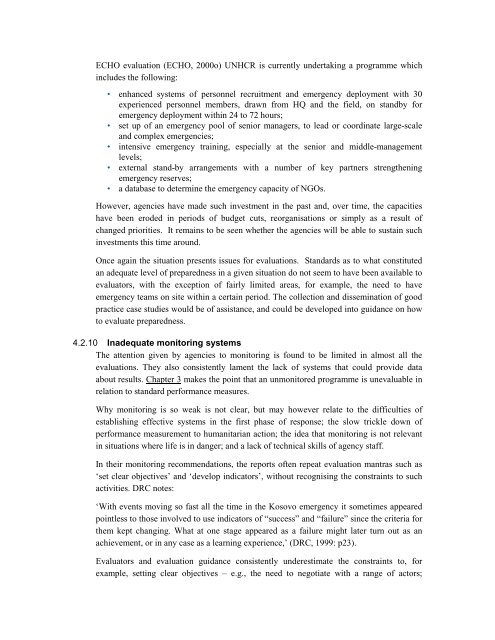Download PDF - ReliefWeb
Download PDF - ReliefWeb
Download PDF - ReliefWeb
You also want an ePaper? Increase the reach of your titles
YUMPU automatically turns print PDFs into web optimized ePapers that Google loves.
ECHO evaluation (ECHO, 2000o) UNHCR is currently undertaking a programme which<br />
includes the following:<br />
• enhanced systems of personnel recruitment and emergency deployment with 30<br />
experienced personnel members, drawn from HQ and the field, on standby for<br />
emergency deployment within 24 to 72 hours;<br />
• set up of an emergency pool of senior managers, to lead or coordinate large-scale<br />
and complex emergencies;<br />
• intensive emergency training, especially at the senior and middle-management<br />
levels;<br />
• external stand-by arrangements with a number of key partners strengthening<br />
emergency reserves;<br />
• a database to determine the emergency capacity of NGOs.<br />
However, agencies have made such investment in the past and, over time, the capacities<br />
have been eroded in periods of budget cuts, reorganisations or simply as a result of<br />
changed priorities. It remains to be seen whether the agencies will be able to sustain such<br />
investments this time around.<br />
Once again the situation presents issues for evaluations. Standards as to what constituted<br />
an adequate level of preparedness in a given situation do not seem to have been available to<br />
evaluators, with the exception of fairly limited areas, for example, the need to have<br />
emergency teams on site within a certain period. The collection and dissemination of good<br />
practice case studies would be of assistance, and could be developed into guidance on how<br />
to evaluate preparedness.<br />
4.2.10 Inadequate monitoring systems<br />
The attention given by agencies to monitoring is found to be limited in almost all the<br />
evaluations. They also consistently lament the lack of systems that could provide data<br />
about results. Chapter 3 makes the point that an unmonitored programme is unevaluable in<br />
relation to standard performance measures.<br />
Why monitoring is so weak is not clear, but may however relate to the difficulties of<br />
establishing effective systems in the first phase of response; the slow trickle down of<br />
performance measurement to humanitarian action; the idea that monitoring is not relevant<br />
in situations where life is in danger; and a lack of technical skills of agency staff.<br />
In their monitoring recommendations, the reports often repeat evaluation mantras such as<br />
‘set clear objectives’ and ‘develop indicators’, without recognising the constraints to such<br />
activities. DRC notes:<br />
‘With events moving so fast all the time in the Kosovo emergency it sometimes appeared<br />
pointless to those involved to use indicators of “success” and “failure” since the criteria for<br />
them kept changing. What at one stage appeared as a failure might later turn out as an<br />
achievement, or in any case as a learning experience,’ (DRC, 1999: p23).<br />
Evaluators and evaluation guidance consistently underestimate the constraints to, for<br />
example, setting clear objectives – e.g., the need to negotiate with a range of actors;
















![CynefinFramework final [Read-Only]](https://img.yumpu.com/19017304/1/190x135/cynefinframework-final-read-only.jpg?quality=85)